M4U1导学案
Module4Unit1导学案
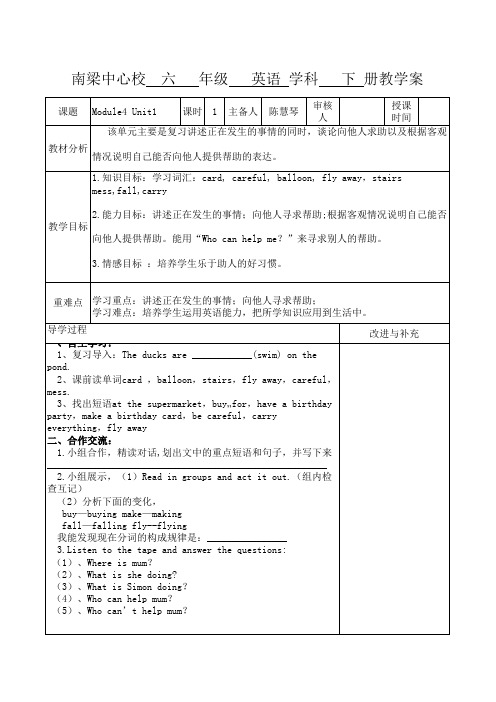
改进与补充
板书设计
教学反思
Module4 Unit1 The balloons are flying away. 正在进行时:主语+be动词+Ving+其他. Who can help me? Yes, I can./Sorry,I cann't.
导学过程 三、解答疑问: (1)、 现在进行时句子的结构:主语+be+动词的ing。 (2)、 寻求帮助与提供帮助 四、当堂检测 五、课堂小结收获:What have you learned in this class ? 六、课后拓展延伸: A: 写五个现在进行时的句子。 B:今天是妈妈的生日,写一个对话,反映你和爸爸分别在做什么准 备,还要涉及帮助话题.
教学目标 向他人提供帮助。能用“Who can help me?”来寻求别人的帮助。 3.情感目生的事情;向他人寻求帮助; 学习难点:培养学生运用英语能力,把所学知识应用到生活中。 导学过程 一、自主学习: 1、复习导入:The ducks are ____________(swim) on the pond. 2、课前读单词card ,balloon,stairs,fly away,careful, mess. 3、找出短语at the supermarket,buy„for,have a birthday party,make a birthday card,be careful,carry everything,fly away 二、合作交流: 1.小组合作,精读对话,划出文中的重点短语和句子,并写下来 ________________________________________________________ 2.小组展示,(1)Read in groups and act it out.(组内检 查互记) (2)分析下面的变化, buy—buying make—making fall—falling fly--flying 我能发现现在分词的构成规律是:________________ 3.Listen to the tape and answer the questions: (1)、Where is mum? (2)、What is she doing? (3)、What is Simon doing? (4)、Who can help mum? (5)、Who can’t help mum? 改进与补充
M4 U1 导学案 学生版
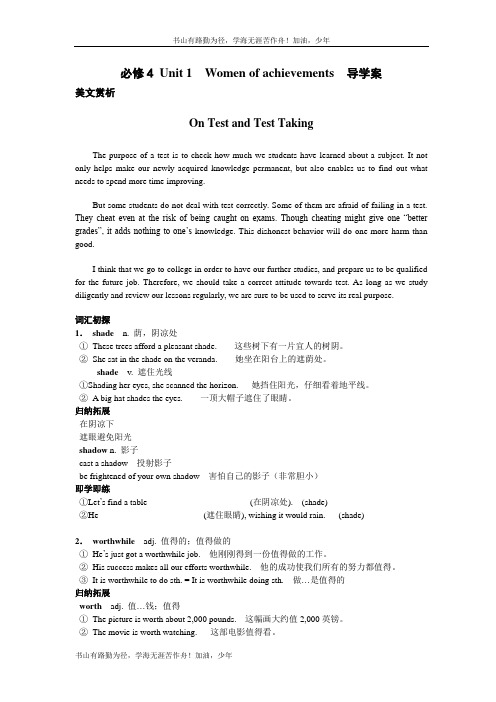
必修4 Unit 1 Women of achievements导学案美文赏析On Test and Test TakingThe purpose of a test is to check how much we students have learned about a subject. It not only helps make our newly acquired knowledge permanent, but also enables us to find out what needs to spend more time improving.But some students do not deal with test correctly. Some of them are afraid of failing in a test. They cheat even at the risk of being caught on exams. Though cheating might give one “better grades”, it adds nothing to one’s knowledge. This dishonest behavior will do one more harm than good.I think that we go to college in order to have our further studies, and prepare us to be qualified for the future job. Therefore, we should take a correct attitude towards test. As long as we study diligently and review our lessons regularly, we are sure to be used to serve its real purpose.词汇初探1.shade n. 荫,阴凉处①These trees afford a pleasant shade. 这些树下有一片宜人的树阴。
徐冬梅牛津英语M4U1导学案

徐冬梅牛津英语M4U1导学案预览说明:预览图片所展示的格式为文档的源格式展示,下载源文件没有水印,内容可编辑和复制M4 U1 AdvertisingPeriod 1 Welcome and reading 1Learning aims:1. To discuss and get some ideas of the two main types of ads and their respected purposes.2. To get involved in the discussion and practice their spoken English.3. To get a general idea about the text.2. To make Ss become familiar with the detailed information about the text.4. To master Reading Strategy.Leaching procedures:●PreviewingDo you know what the meaning of each sentence is and what grand it advertises for?1. The taste is great.2. Ask for more.3. Just do it.4. Let us make things better.5. Obey your thirst.6. Enjoy Coca-Cola.7. Generation Next.8. Communication unlimited.9. Poetry in motion, dancing close to me10. Take toshiba, take the world.11. Good to the last drop12. No business too small, no problem too big13. Feel the new space.●Reading1、Fast-reading---skim the article and get the answer to each question.1. What?s an advertisement?2. How many types of advertising do you know according to the passage?3. Where can we find these ads?4. What are ads used for?5. What do advertisements encourage people to do?6. What does PSAs stand for?7. What are PSAs meant to do?8. When did China begin a nationwide public service advertising campaign?9. Why should we follow the advice in PSAs?2、Detailed-reading ---True for False1. Advertisements are found in many places.2. PSAs are only found in newspapers.3. All advertisements tell the complete truth.4. PSAs and commercial ads use some of the same methods.5. Commercial ads can give us valuable information about how to live our lives.6. An ad warning people against smoking is an example of a PSA.3、Note-taking---What are the similarities and the difference between commercial●Reading comprehensionChoose the correct answer according to the text.1. Which of the following is true according to this reading passage?A. All people enjoy seeing and hearing all kinds of advertisements.B. Many people think advertisements are the most important in their everyday life.C. Many people are quite used to seeing and hearing various advertisements.D. All advertisements give people very important information.2. The writer of this reading passage wants to ______.A. tell his readers what are advertisementB. share some important information about advertisements with readersC. tell his readers how important advertisements areD. tell his reader why people are used to seeing and hearing all kinds of advertisements3. Which of the following can not be regarded as an advertisement ______?A. …Yes to life, no to drugs.?B.…Project Hope---school every child.?C. …Good to the last drop.?D. …The car accident kil ls four passengers.?4. The main difference between commercial advertisements and public service advertisements is that ______.A. public service advertisements cost only a little money while commercial ones cost a lotB. public service advertisements deal with public issues but commercial ones don?tC. commercial advertisements sometimes deal with serious social problemsD. public service advertisements tell the complete truth but commercial ones don?t5. Some of the advertisements are clever because ______.A. they don?t tell the complete truth to customers though they don?t lieB. they use the most beautiful language and imagesC. they are made so beautiful and can be found almost everywhereD. they don?t tell lies directly to the customers6. Which of the following topics will be talked about in a public service advertisement ____?A. A new car factory that will be built in China next year.B. A good harvest of oranges is expected this year.C. Tea will take the place of coffee.D. A paper bag will make your home cleaner.ConsolidationFind the missing words and complete the following sentences according to the text.1. Advertisements use language and images to encourage customers to buy a product or service or in an idea.2. Advertisements can be into two major commercial advertisements and public service advertisements.3. Public service advertisements are used to people about health, safety or some other large issues.4. Not all commercial advertisements tell people the truth and sometimes some of they will play some on customers.5. Customers should be of the methods in advertisements totry and sell us things.6. The government sometimes uses public service advertisements, which are often used for , to educate people about some issues that public welfare.7. some commercial advertisements sometimes don?t lie, we should learn to be about them.8. All public service advertisements are meant to be and we should something from them.M4 U1 AdvertisingPeriod 2 Advertisement Reading 2 Language Focus Learning aims:To grasp the usage of some important words and expressions.Teaching important point:1. How to help the students be familiar with the language points.2. How to help Ss apply these points into practice.Language points:1. We are so used to them that we often do not even realize how many we see and hear in a day.比较:be used to do / doing sth. used to be used to do1)The new machine _____production. However I_____ it.A. is used to increase; am not used to controllingB. is used to increasing; don?t used to controlC. used to increase; don?t used to cont rolD. used to increasing; am not used to control 2)—Is that the small town you often refer to?—Right, just the one where you know I for years.(以前工作过)3)This is a woman who long hours and traveling extensively.(习惯于工作)4)Cotton over 40% of the world's textiles. (用来做)5)Used she (Did she use) to go to school by bike? Yes, she_____________________.2. I did some research on advertisements, and have some very important information to share with you.share vt. 分享,分担,共有;共同使用n. 1.一份 a share in/of sth. 一份… 2.股份;股票短语拓展:share (out) between/among 分配,分摊给……;share in sth. 分享某物;share (in) sth with /among/between sb. 与……分享(某物),将某事告诉(某人)do one?s share for 为……尽自己的一份力量;go shares (with) 平分;分享;完成句子:1)Sam and I .山姆和我合住一间房间。
M4U1导学案

拓
展
延
伸
用there be, have(has) got填空
1、a desk in th
3、theya daughter ?
根据要求完成句子
You can begin like this:
----How many people are there in your family?
----There are ……
----Have you got any grandparents / brothers ……?
---Yes,I have . I’ve got ....... His / Her name is ...... Their name’s are.....
________________________________________________________________
________________________________________________________________
巩
固
提
高
Ask and answer with your partner .(Activity6)
SM4U1导学案
课时:1课型:新授备课人:兰东方戴红周文博
学
习
目
标
1、have got和has got表示“有”;
2、how many提问与there be的回答。
3、能运用there be和have got介绍自己的家庭;
4、培养对家庭的爱和对家庭成员的关心。
自
学
外研版九年级(上)英语导学案:M4U1

外研版九年级(上)英语导学案:M4U1九年级英语上册导学案课题M4 Home alone Unit 1 I can look after myself ,although it won’t be easy for me课型Listening and speaking【学习目标】1.掌握本单元的重点单词platform,meeting,miss,shut,lock,simple,anybody,clock,ring,p assenger,address,Text, couple,2. 掌握本单元的重点短语:text message,a couple of3.掌握本单元的经典句型:so am I.Your train is about to leave.I can look after myself ,although it won’t be easy for me.My clock rings so loudly that it will certainly wake me up.4.掌握so...that,although引导的结果和让步状语从句。
5.能听懂有关独自在家的简短对话。
【学习重点和难点】能够正确使用so...that,although引导的结果和让步状语从句【学习方法】小组合作、交流讨论【Learning process】ⅠPreview1 I'm brilliant, and I can write the words according to phonetic symbols.(Believing in yourself, you can do it.)phonogram word Chinese phonogram word Chinese phonogram word Chinesepl?tf?:m l?k r i??mi:ts?mpl ?p?s?nd??m?s?e nib?di ??drest kl?k tekstk?p2 Preview the text and find the following phrases from the text.(It's difficult, so remember to communicate!)(1)短信(2)两个(3)许多的(4)我也是(5)wake up(6)go outⅡCooperative learning【Pre-listening】Work in pairs. Talk about the picture.(Activity1)Listen and answer the questions.(Activity2)Listen again and complete the sentences.(Activity3)【While-listening】There is a conversation between Betty and her parents. Listen and read.【Post-listening】1.Read the dialogue and complete the sentences. There may be more than one answer.(Activity4)2.Choose the correct answer.(Activity5)3. Read and try to recite the conversations in 5-10 minutes.Let’s see which group does the best4.Let’s make up a dialogue like this:A:Can you look after yourself?B:Yes,I can./No,I can’t.A:How will you make sure you wake up in the morning?B:I’ll make the clock ring loudly.A:How will you eat?B:.............5.Pronunciation and speaking.(1)Listen and mark the words which the speaker links.1 Be especially careful with the door. Shut it when you’re in and lock it when you go out.2 I can l ook after myself, although it won’t be easy for me.3 I’m sure I’ve forgotten something, but I don’t know what it is!【Summary】I study, and I summarize.【Classroom consolidation】Ⅰ. 单项选择。
英语七年级上册Module4 Unit1 导学案

英语七年级上册Module4 Unit1 导学案设计人:审核人:【学习目标】1.会读会写:day, today, Monday, Tuesday, Wednesday, Thursday, Friday, Saturday,Sunday, birthday, favourite.2.会使用这些句子与他人交流:--What day is it today? --It’s Monday.--What day is it tomorrow? --Tomorrow is Tuesday.3.能结合实际,自如问答星期,培养学生大胆展示的习惯。
【学习重点】掌握询问星期的句型:--What day is it today? --It’s Monday.【学习难点】星期的英语拼写【学习方法】积极与他人合作,大胆展示自己。
自学(学法指导:听录音时要认真,大胆张嘴模仿,注意语音语调。
)1.词汇速通。
星期一_________星期二______星期三 _______星期四__________星期五 ________星期六 ______星期天_______最喜爱的 _______2.看课本S20的第1题,听录音读一读。
3.完成第2题,听录音并跟读,注意语音语调。
4.完成课本第3题,读一读并且连线搭配,完成后听录音检查自己的答案。
研学(学法指导:注意题目要求,遵循组长分配,积极讨论,大胆展示。
)1.知识链接:What day is it today?今天星期几?本句是由What day引导的特殊疑问句,用来询问星期几,回答时可以用“It’s + 星期”如:It’s Monday.也可以直接用星期来作答。
如果想询问明天星期几,则用:What day is it tomorrow? Tomorrow is Tuesday.翻译下列句子:今天星期几?_____________________星期六。
_____________________明天星期几?_____________________星期天。
2023外研社小学英语课件(一起点)M4U1导学案

2020-2021学年第二学期五年级英语Module 4 Unit 1 导学案一、学习目标:1.会读单词:library, student, sent, CD, idea, put, shelf, heavy, dictionary, card, library card, ask, wrong, dear2.根据发音补全下列单词:library, sent, idea, put, heavy, card, ask, wrong3.准确流利的朗读课文。
二、学习重难点:认知新单词并准确朗读课文三、学习达标:【课前预习】同学们,我们之前已经学过很多学科的表达,把你知道的学科单词写下来吧,看看谁记住得更多!____________________________________________________________________________________________________【课文学习】Task 1:Watch, listen and answer.看动画,回答问题。
1.How many kinds of books are there?________________________________________________________2.What are they? They are books about ___________.A. ChineseB. scienceC. animalsD. EnglishE. artF. sportsG. musicH. computers3.What are the big books?They are ___________.Task 2: Listen repeat and answer.听音跟读回答问题。
1.Where do they put the books?They put the books _____________.2. Do they put the CDs with the books?__________________.3.Are the big books heavy?__________________.4.Where are the books about art?They are _________.5.Where are the books about computers?They are _________.【巩固提升】独立完成以下单选题,看谁做得又快又准!(2 min)一、补全单词1. c__d2. he_vy3. wro__4. ide_5. s_nt6. _sk7. libr_ry 8. p_t二、用括号里所给单词的正确形式填空。
小学英语五年级导学案M4U1(设计人:田开丽)

小学英语五年级导学案Module4Unit1(设计人:田开丽)一、学习目标:A.听说读写短语:drawing pictures, doing the dishes, cooking dinner, reading a book , answering the phone;B. 听、说、读、认Let’s talk 中的句子。
C. 运用句型:What are you doing? / I’m…进行询问和回答。
二、预习学案:I can remember 听写小能手(听写—对改—改错—报到)快把写错的单词改两遍吧!I can listen. 听力闯关三、导学案:1. 看课本Listen and tick,运用我们学过的短语说一说他们都在做什么?2. 听录音,一起来做“Let’s try!”We can work together. 一起来学3. 自读短文Let’s talk。
4.听录音学对话。
5.小组练习对话。
6、I can show. 展示自我(准备内容—组内小展—报到)相信对话你已经练习的很熟练了,怎么样?不要犹豫啦,用你们小组的展示方式大胆的SHOW 出来吧!Come on!You are the best!参考句型:What are you doing? I’m drawing pictures / doing the dishes / cooking dinner/ reading abook / answering the phone …参考展示方式:熟读翻译对话,背诵对话,创编对话,表演双簧,现在进行时态的理解,pair work中的小游戏等等;I can do.四、课堂检测1、选择正确答案,将其序号填在提前括号内。
()1).当你要询问别人在做什么时可以说:A.What are you doing? B. Where are you going?( )2).当别人问你在做什么时,你应回答:A.I can play basketball. B. I ’ m playing basketball.( )3). 句子I’m drawing pictures的汉语意思是:A.我画了一幅画。
外研社八年级上册M4U1(第二课时)导学案
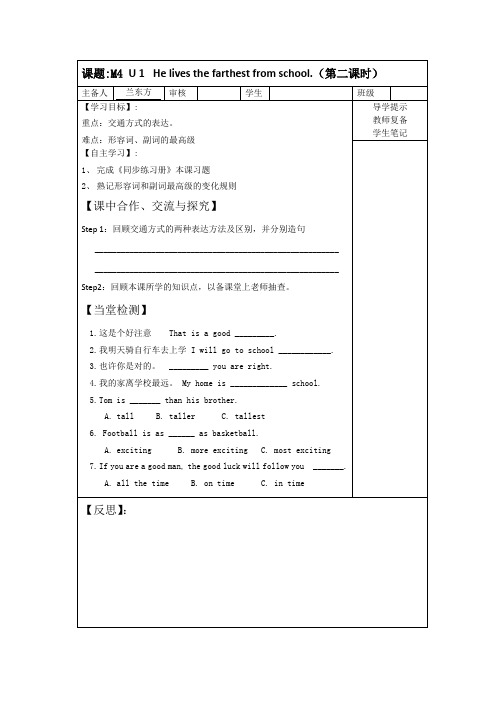
导学提示
教师复备
学生笔记
【反思】:
2.我明天骑自行车去上学I will go to school ____________.
3.也许你是对的。_________ you are right.
4.我的家离学校最远。My home is _____________ school.
5.Tom is _______ than his brother.
________________________________________________________
________________________________________________________
Step2:回顾本课所学的知识点,以备课堂上老师抽查。
【当堂检测】
1.这是个好注意That is a good _________.
A.tall B. taller C. tallest
6.Football is as ______ as basketball.
A.exciting B. more exciting C. most exciting
7.If you are a good man, the good luck will follow you _______.
课题:M4U 1He lives the farthest from school.(第二课时)
主备人
兰东方
审核
学生
班级
【学习目标】:
重点:交通方式的表达。
难点:形容词、副词的最高级
【自主学习】:
1、完成《同步练习册》本课习题
module 4unit 1导学案
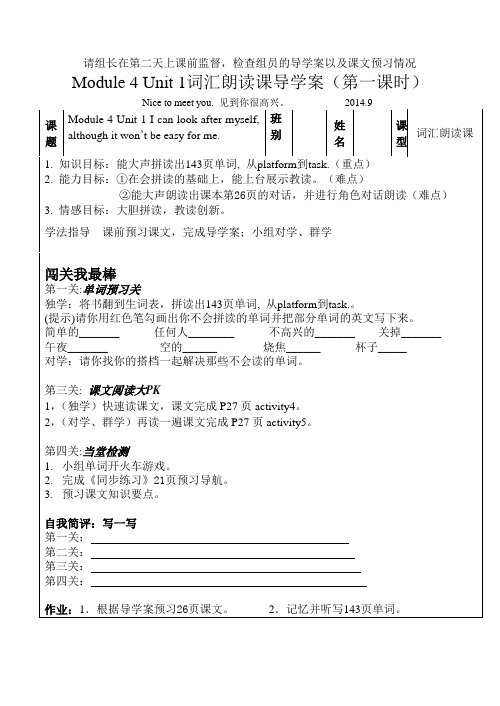
课前三分钟,默写单词。请每组派一个代表上黑板默写,其他组员写在听写本上,每写对一个加10分。
第二关:找短语PK
(独学)朗读26页课文找出这些词组并用红笔标出来。
(对学、群学)同学讨论合作翻译一下词组。
1.I am sorry2.So am I
3.be careful with sth.4.go out
A. so Lingling doesB. so is LinglingC. so does Lingling.
自我简评:
(同学们,这节课即将结束了,请问你在这节课学到了什么?还有什么疑问?说一说吧……)
第一关:
第二关:
第三关:
第四关:
第五关:
作业:完成《同步练习》P22,23页练习。
拓展:because “因为…”不能与so连同使用。
知识点4:My clock rings so loudly that it can certainly wake me up.
翻译:
So+形容词、副词+that从句“如此….以至于…”
可以用too+形容词/副词+to+动原“太…而不能….”替换
Eg. My sister is so young that she can’t go to school. === My sister is too young to go to school.
请组长在第二天上课前监督,检查组员的导学案以及课文预习情况
Module4Unit1词汇朗读课导学案(第一课时)
Nice to meet you.见到你很高兴。2014.9
课题
Module4Unit1 I can look after myself, although it won’t be easy for me.
M4U1导学案教师版 学生版祥解
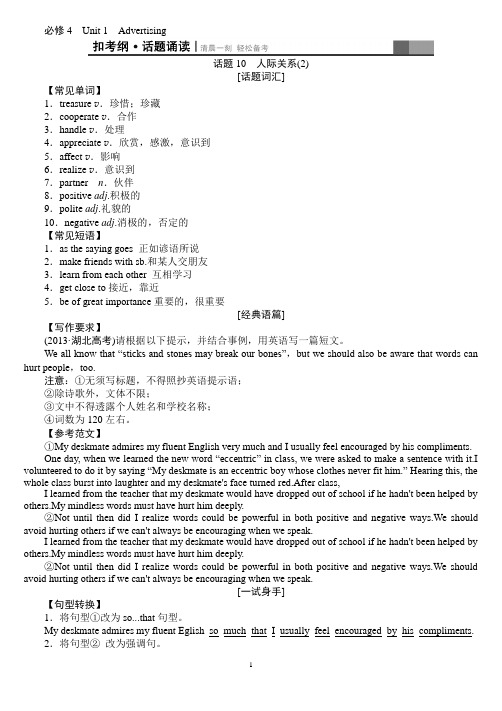
必修4Unit 1Advertising话题10人际关系(2)[话题词汇]【常见单词】1.treasure v.珍惜;珍藏2.cooperate v.合作3.handle v.处理4.appreciate v.欣赏,感激,意识到5.affect v.影响6.realize v.意识到7.partner n.伙伴8.positive adj.积极的9.polite adj.礼貌的10.negative adj.消极的,否定的【常见短语】1.as the saying goes 正如谚语所说2.make friends with sb.和某人交朋友3.learn from each other 互相学习4.get close to接近,靠近5.be of great importance重要的,很重要[经典语篇]【写作要求】(2013·湖北高考)请根据以下提示,并结合事例,用英语写一篇短文。
We all know that “sticks and stones may break our bones”,but we should also be aware that words can hurt people,too.注意:①无须写标题,不得照抄英语提示语;②除诗歌外,文体不限;③文中不得透露个人姓名和学校名称;④词数为120左右。
【参考范文】①My deskmate admires my fluent English very much and I usually feel encouraged by his compliments.One day, when we learned th e new word “eccentric” in class, we were asked to make a sentence with it.I volunteered to do it by saying “My deskmate is an eccentric boy whose clothes never fit him.” Hearing this, the whole class burst into laughter and my deskmate's face turned red.After class,I learned from the teacher that my deskmate would have dropped out of school if he hadn't been helped by others.My mindless words must have hurt him deeply.②Not until then did I realize words could be powerful in both positive and negative ways.We should avoid hurting others if we can't always be encouraging when we speak.I learned from the teacher that my deskmate would have dropped out of school if he hadn't been helped by others.My mindless words must have hurt him deeply.②Not until then did I realize words could be powerful in both positive and negative ways.We should avoid hurting others if we can't always be encouraging when we speak.[一试身手]【句型转换】1.将句型①改为so...that句型。
M4U1 单元导学案

M4U1 Women of achievement单元导学案Background readingJane Goodall in AfricaGoodall had always been passionate about animals and Africa, which brought her to the farm of a friend in the Kenya highlands in 1957. From there, she obtained work as a secretary, and acting on her friend's advice, she telephoned Louis Leakey, a Kenyan archaeologist and palaeontologist, with no other thought than to make an appointment to discuss animals. Leakey, believing that the study of existing great apes could provide indications of the behaviour of early hominids, was looking for a chimpanzee researcher, though he kept the idea to himself. Instead, he proposed that Goodall work for him as a secretary. After obtaining his wife Mary Leakey's approval, Louis sent Goodall to Olduvai Gorge in Tanzania, where he laid out his plans.In 1958, Leakey sent Goodall to London to study primate behaviour with Osman Hill and primate anatomy with John Napier. Leakey raised funds, and on 14 July 1960, Goodall went to Gombe Stream National Park, becoming the first of what would come to be called The Trimates. She was accompanied by her mother, whose presence was necessary to satisfy the requirements of David Anstey, chief warden, who was concerned for their safety; Tanzania was "Tanganyika" at that time and a British protectorate.Leakey arranged funding and in 1962, he sent Goodall, who had no degree, to Cambridge University where she obtained a PhD degree in Ethology. She became only the eighth person to be allowed to study for a PhD there without first having obtained a BA or BSc. Her thesis was completed in 1965 under the tutorship of Robert Hinde, former master of St. John's College, Cambridge, title d “Behaviour of the Free-Ranging Chimpanzee”, detailing her first five years of study at the Gombe Reserve.Read and decide if the following statements are true or false.1.Jane Goodall wasn’t interested in animals until she got to Africa.2.She got to know Louis Leakey with the help of her friend.3.Leakey was looking for a history researcher.4.Goodall was sent to carry out Louis’s plan.5.Goodall sent Leakey to London.6.Goodall was accompanied by her husband.7.What made her degree special was she was sent by Leakey.8.Robert Hinde helped her complete her thesis.9.Her thesis was related to her study at the Gombe Reserve.10.Jane Goodall successfully achieved her PhD degree after receiving her BA or BSc.VocabularyPart A Fill in the blanks with the correct words1. Nothing can prevent him from a his ambition.2. We a with the waiter about the price of the meal.3. Drivers should o the speed limit so that they will arrive home safe. .4. So far, we have achieved many great __________ (成就).5. There seems to be no __________ (关系) between the two things.6. __________(激励) by her teacher, the girl student worked harder and soon made great progress.7. He had to do an extra job after work, for he had a big family to s___________.8. A man with good manners always b__________ well.9. In our office almost everyone is for the anti-smoking c .10. Nowadays few children are _______________(体贴的) towards their parents.11. The president of Toyota ______________(发表)a speech on TV and apologized for the mistakes they made.12. If what I said hurt you, it was quite without ___________(意图).13. Most people walk at an average ____________(速率) of 5 kilometres an hour.14. Your teacher will take it into __________________(考虑) that you were ill when taking exams.15. A theme park is a place of _____________(娱乐).Part B Complete the following sentences:1. 很多人把德国和啤酒联想在一起。
m4 Unit1 导学案
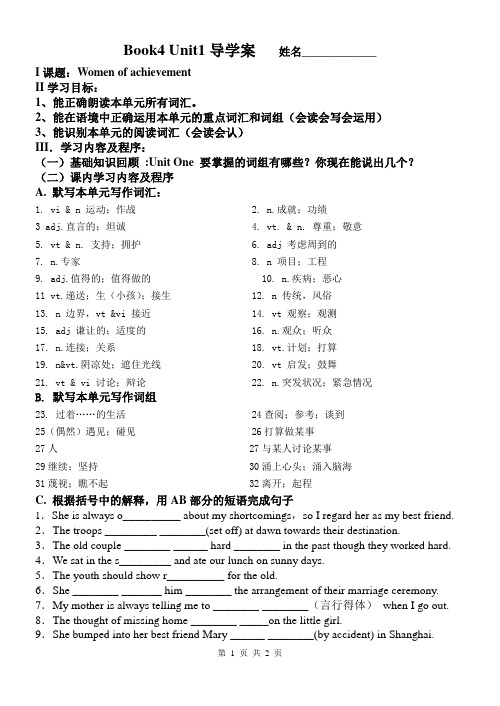
Book4 Unit1导学案姓名_____________I课题:Women of achievementII学习目标:1、能正确朗读本单元所有词汇。
2、能在语境中正确运用本单元的重点词汇和词组(会读会写会运用)3、能识别本单元的阅读词汇(会读会认)III.学习内容及程序:(一)基础知识回顾:Unit One 要掌握的词组有哪些?你现在能说出几个?(二)课内学习内容及程序A. 默写本单元写作词汇:1. vi & n 运动;作战2. n.成就;功绩3 adj.直言的;坦诚 4. vt. & n. 尊重;敬意5. vt & n. 支持;拥护6. adj 考虑周到的7. n.专家 8. n 项目;工程9. adj.值得的;值得做的 10. n.疾病;恶心11 vt.递送;生(小孩);接生 12. n 传统,风俗13. n 边界,vt &vi 接近 14. vt 观察;观测15. adj 谦让的;适度的 16. n.观众;听众17. n.连接;关系 18. vt.计划;打算19. n&vt.阴凉处;遮住光线 20. vt 启发;鼓舞21. vt & vi 讨论;辩论 22. n.突发状况;紧急情况B. 默写本单元写作词组23. 过着……的生活 24查阅;参考;谈到25(偶然)遇见;碰见 26打算做某事27人 27与某人讨论某事29继续;坚持 30涌上心头;涌入脑海31蔑视;瞧不起 32离开;起程C. 根据括号中的解释,用AB部分的短语完成句子1.She is always o__________ about my shortcomings,so I regard her as my best friend. 2.The troops _________ ________(set off) at dawn towards their destination.3.The old couple ________ ______ hard ________ in the past though they worked hard. 4.We sat in the s_________ and ate our lunch on sunny days.5.The youth should show r__________ for the old.6.She ________ _______ him ________ the arrangement of their marriage ceremony. 7.My mother is always telling me to ________ ________(言行得体)when I go out. 8.The thought of missing home ________ _____on the little girl.9.She bumped into her best friend Mary ______ ________(by accident) in Shanghai.10.They ________ _______ the famous scientist at the airport the day before yesterday. 11.Though _______ _______ ______,the boy continued his efforts and succeeded at last. 12.The girl insisted on ________ ______ her sick mother as her brother had to go abroad on business.13.His sister-in-law was ___________ of a boy weighing 8.8 jin last week.D. 完成短文填空Jane Goodall had been looking forward to o_________ chimps in the wild since her c________. In 1960, she was able to begin her project. Sometimes she had to wait in the s______ of the trees, watching chimps m_____ ____ or go to sleep in their n_____. All her efforts are w_________. Because of her o__________, people now fully understand chimp b_________ and how much they b________ like human beings. People also realize the b_____ between chimps is quite strong. Jane is quite o_______ about her opinion. She a_______ that we should r_______ chimps and they shouldn’t be used for e__________ or any other purposes.What Jane Goodall has done or is doing i________ women all over the world.E请根据括号内所给的提示翻译下列句子。
M4U1Reading导学案含答案(可编辑修改word版)
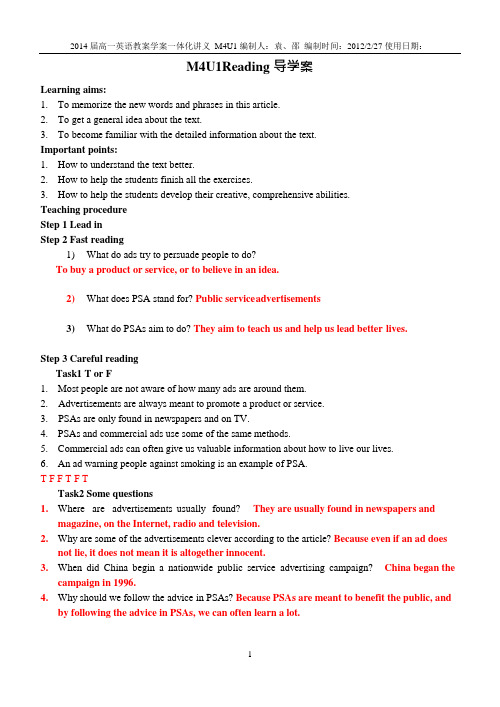
M4U1Reading 导学案Learning aims:1.To memorize the new words and phrases in this article.2.To get a general idea about the text.3.To become familiar with the detailed information about the text.Important points:1.How to understand the text better.2.How to help the students finish all the exercises.3.How to help the students develop their creative, comprehensive abilities.Teaching procedureStep 1 Lead inStep 2 Fast reading1)What do ads try to persuade people to do?To buy a product or service, or to believe in an idea.2)What does PSA stand for? Public service a dvertisements3)What do PSAs aim to do? They aim to teach us and help us lead better lives.Step 3 Careful readingTask1 T or F1.Most people are not aware of how many ads are around them.2.Advertisements are always meant to promote a product or service.3.PSAs are only found in newspapers and on TV.4.PSAs and commercial ads use some of the same methods.mercial ads can often give us valuable information about how to live our lives.6.An ad warning people against smoking is an example of PSA.T F F T F TTask2 Some questions1.Where are advertisements usually found? They are usually found in newspapers andmagazine, on the Internet, radio and television.2.Why are some of the advertisements clever according to the article? Because even if an ad doesnot lie, it does not mean it is altogether innocent.3.When did China begin a nationwide public service advertising campaign? China began thecampaign in 1996.4.Why should we follow the advice in PSAs? Because PSAs are meant to benefit the public, andby following the advice in PSAs, we can often learn a lot.Step 4 Reading strategy1.What is expository writing meant to do?It is meant to introduce you to basic information on a topic.2.What is its basic format?Introduction of the subject, examples and facts that develop or support the details, conclusion. Step 5 Discussion1.Do you think young people are easily persuaded by ads? Why or why not?2.What is the best PSA you have ever seen? Why do you think it is so good?Step 6 Homework1.Read the passage again and again.2.Try to keep the new words in mind.Language pointsDifficult sentences1.We are so used to them that we often do not even realize how many we see and hear in a day. So…that…引导结果状语从句,意为“如此···以至于···”常用句式:so +adj./adv.+thatso +adj. +a(n)+单数名词+thatso +many/few+复数名词+thatso +much/little+不可数名词+thatHe runs nobody can catch up with him.他跑得非常快,以至于没人能追上他。
module4unit1导学案

Module 4 Planes, ships and trains本模块学习目标:1.记住并能默写本课新单词、短语和重点句型。
2.掌握形容词和副词最高级的构成及用法。
3.掌握交通方式的表达,并能运用形容词和副词的最高级介绍常见交通方式的特点。
4.能介绍自己或他人的旅行以及乘坐的交通工具。
Unit 1 He lives the farthest from school.一、课前预习:(一)预习单词及本课对话,用英语读出并写出下列单词和短语。
路交通事故除…之外选择同班同学远,遥远近的拥挤的乘出租车最舒服的方式骑自行车大多数的小心和…一样远离一直(二)自读课文对话,并能翻译、背诵和默写下列重点句型。
1.What happened?2.Maybe I should go to school by taxi.3.It’s the most comfortable way, but it’s also the most expensive.4.Then what about going by bike? That’s a good choice.5.Don’t worry. I’ll be careful!6.He lives the farthest from school.写出下列形容词和副词的最高级。
tall long short largeclose late big hot busyeasy comfortable expensive dangerous小组合作探究:形容词和副词最高级的规则变化1.单音节和少数双音节词:A. 一般在词尾加______________ ;B .以字母e结尾的词直接加_________________ ;C . 以辅音字母+y 结尾的词,先______________________ ;D . 以重读闭音节结尾,末尾只有一个辅音字母的______________________ ,再加_________________ .2.大部分双音节词和多音节词:在词前加__________________________ 。
- 1、下载文档前请自行甄别文档内容的完整性,平台不提供额外的编辑、内容补充、找答案等附加服务。
- 2、"仅部分预览"的文档,不可在线预览部分如存在完整性等问题,可反馈申请退款(可完整预览的文档不适用该条件!)。
- 3、如文档侵犯您的权益,请联系客服反馈,我们会尽快为您处理(人工客服工作时间:9:00-18:30)。
M2U1 Everyone will study at home.
班级姓名小组评价
【学习目标】:
知识目标:
1、掌握重点单词及短语。
2、will 的用法。
【学习重点】will 的用法
【学习难点】:will 和be going to 的异同
【课前预习】:
根据音标及要求写单词
[tʃɔ:k]____________[ˈru:lə]___________[ˈkæri]_____________ [tʃeindʒ]____________
[ˈevriθiŋ]__________[ˈfju:tʃə]________[ˈkwestʃən]___________[ˈmeibi:]___ _________
写出下列短语
将来__________能够做_________________不再________ 20年之后____________ 从网上获取信息___________交朋友__________________检测学生都水平________ 很多空余时间____________在家学习_____________________
重点句子
1.每个人将在家里学习。
2.20年之后,可能将没有学校。
3.电脑将不能那样做。
4.学生们将有很多作业做吗?
5.将来学校有不同吗?
Language points (语言点学习)
1. Everyone will study at home in the future. 将来每个人都在家里学习。
这里“will+动词原形”和“be going to+动词原形”都是表示“将来”某个时间将要发生的动作或存在的状态。
“will”通常表示将来要发生都事。
“be going to+动词原形”表示打算或计划准备要做某事。
Students will use computers to learn. 学生们将利用计算机来学习。
I’m going to have a piano lesson next week. 我打算下周上钢琴课。
will表示的一般将来时,本身没有人称和数的变化。
如果要表达“将来不会……”,就要用其否定形式,我们可以在will后直接加not,构成will not或缩写为won’t。
如:
Students will study on the Internet. They won’t use books.
学生们将在互联网上学习。
他们将不再使用书。
如果询问将来的事,我们用其疑问形式,即将will提到句首即可。
如:
Will students go to school in the future? 将来学生们还去学校吗?
2.There won’t be any schools. 将没有学校。
一般将来时态用在出there be句型中就是“There will be…”。
如:
There will be a big park over there. 那边将建成一个大型的公园。
be going to 也可以用在there be句型中,即“There is/are going to be…”,注意该句型有单复数的变化。
如:
There is going to be an English party this weekend. 本周末有一个英语晚会。
3.They can ask their teachers questions by Internet,telephone or email. by在此处是介词,表示方法、手段或方式,是“用……,靠……,通过……”之意。
如:Send it by air mail! 用航空邮件寄吧!
They want to travel by train. 他们想坐火车旅行。
【学以致用,拓展提升】
根据句意及首字母完成单词。
1、What will our l________ be like in ten years?
2、There will be a computer on every desk in the f__________.
3、The boy is writing on the blackboard with c___________.
4、—Do you have a r__________?
—Yes, I do. But it’s a short one.
5、There is a big piece of red p_________ on the desk.
1. Everyone ________ English hard in our class.
A. study
B. studys
C. studies
D. studying
( )2. Our Chinese teacher ______a computer _______ teach us this text.
A. uses , to
B. use , for
C. using , to
D. to use , with
( )3. There will be a computer ______ every desk ______ the future.
A. in , on
B. on , in
C. at , for
D. to , at
( )4. —Will there be schools in the future? —No, there _______.
A. isn’t
B. won’t be
C. won’t
D. will be not
( )5. —Will they send their homework __ the teacher _____ email?
—Yes, they will.
A. for , by
B. at , with
C. to , by
D. by , to
( )7.---- Will you read books in the library?
---- _______.
A. Yes, we won’t
B. No, we will
C. Yes, we will
D. No, we don’t ( )8. Cathy ______ her homework to her teacher by email tomorrow.
A. will send
B. will sent
C. sends
D. sending ( )9.Tom is ______ a picnic.
A. have
B. haveing
C. has
D. having
根据汉语提示完成下列句子。
1、在将来会有学校吗?
______ there be schools ______ ______ _______?
2、他们将通过电子邮件将作业发给老师吗?
Will they ______ their homework ______ the teacher _____ ______?
3、学生们将通过电脑和老师谈话。
The students will ______ _______ their teachers _______ their computers
4、请给我一支粉笔.
Please give me __________ _________ _________ ____________.
5、人们将通过电脑互相交谈。
People _________ _________ ________ each other ___________ their computers.
6、在将来,每个课桌上都将有一台计算机吗?
In the future, ________ __________ ___________a computer on every desk?。
